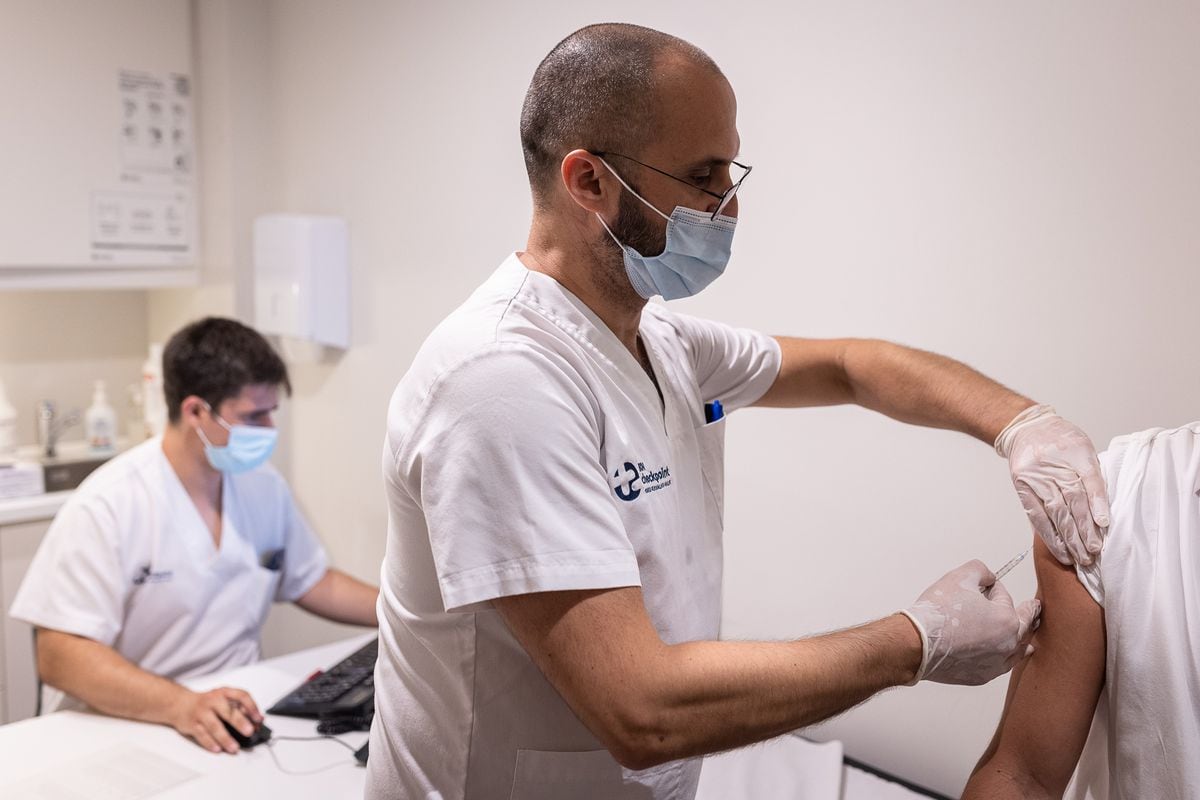Enlarge image
The World Health Organization (WHO) has called for urgent action to be taken to stop the spread of monkeypox.
Skin lesions in patients can be seen in this image
Photo: - / dpa
First of all: A virus doesn't care about the sexual orientation of its host.
Nonetheless, one community has come into focus in connection with the emerging cases of monkeypox: men who have sex with men.
This group, which is medically described by the abbreviation MSM, includes, among others, gay and bisexual men who have same-sex sex.
Among the more than 90 cases confirmed by the World Health Organization (WHO) as of Sunday afternoon are a disproportionately large number of younger men who say they have had sexual contact with men.
Other suspected cases also occur not only, but increasingly in this group.
How can this accumulation be explained?
And what follows from this?
A rodent virus named after laboratory monkeys
Monkeypox has been known for more than six decades.
Its name is somewhat misleading: the virus is thought to circulate in rodents and other small mammals.
But in 1958 the pathogen was first detected in a group of monkeys kept for research purposes and named after them.
Monkeys are considered false hosts for the virus, the pathogen is not primarily adapted to them.
Still, transmission is possible — and what works from rodent to monkey can also happen from rodent to human.
more on the subject
Danger from zoonoses: Where the next pandemic will come from - and how it can be prevented An analysis by Viola Kiel
The first case of monkeypox in a human was recorded in 1970 in the Democratic Republic of the Congo, in a small child.
After that, the virus also appeared in other African countries.
Monkeypox was first detected outside of the continent in 2003 when a few dozen cases were reported in the United States.
The outbreak there has been linked to prairie dogs infected by other animals imported from Ghana, Science magazine said.
Zoonosis is when a virus spreads from an animal to a human.
Transmission can occur, for example, when people process the meat of an infected animal.
The virus can be transmitted through close contact
The transmission of monkeypox from person to person was previously considered rare.
But the rising number of cases is causing some experts to worry that the virus may have acquired other skills.
"The current outbreak indicates a change in human-to-human transmission," wrote Leif Erik Sander, head of the Infectious Diseases Clinic at the Berlin Charité, on Twitter on Thursday.
Experts still have to clarify how and to what extent.
more on the subject
Viral Infection: What Do The Global Monkeypox Cases Mean?
The symptoms of a monkeypox infection include sudden onset of fever, severe headache, back pain, sore throat, cough, and often also swelling of the lymph nodes.
A rash extending from the face to the body with blisters or pustules is also typical.
Most people recover within a few weeks.
Symptomatic patients are contagious through close contact as long as the smallpox has not completely healed and the scabs have not yet fallen off - this is usually the case after two to three weeks.
Are men who have sex with men particularly at risk?
The first case of the current outbreak outside of the African continent was confirmed in Great Britain on May 7th.
The patient is a man who returned to the UK from Nigeria on May 4.
According to the British health authority, however, the patient was not linked to the other cases discovered so far.
This indicates that the virus may have been imported several times.
It is also possible that monkeypox appeared before May but was not discovered or correctly diagnosed.
more on the subject
Media report on monkeypox: Spanish authorities apparently suspect celebrations on Gran Canaria as the source of the outbreak
Since the case became known in Great Britain, suspected cases have been reported in Spain, Portugal, the USA, Canada, Sweden, Italy, France, Germany, Australia and Israel, among others.
"According to the information currently available, cases have been identified primarily, but not exclusively, in men who have sex with men (MSM)," the WHO said.
Those affected sought treatment in primary care and sexual health clinics.
Experts around the world consider it unlikely that monkeypox could become a problem of pandemic proportions.
But concern is raised about the possibility that sexual transmission may have contributed to the current outbreak.
"That's not typical at all," said Rosamund Lewis, an epidemiologist who is responsible for smallpox diseases at the WHO, to "Science".
According to the report, as early as 2017, Nigerian experts raised the possibility that monkeypox could have been sexually transmitted.
Genital ulcers were found in several patients.
more on the subject
Concern about spread: WHO urgently calls for measures against monkeypox
Fernando Simón, head of the coordination center for health warnings and emergencies of the Spanish Ministry of Health, also commented on the current situation in the “Science” article.
He said the seven monkeypox cases reported in Spain as of May 19 were of MSM or trans people attending sex parties.
"Most of the cases have only perigenital, perianal and around the mouth lesions," he said.
There is no evidence that the virus can be transmitted through semen.
It is more likely to be infected by touching the so-called lesions, the smallpox and pustules on the skin of a sick person.
A higher risk of sexually transmitted diseases
Whether man and woman, woman and woman, man and man, or more than two people – if you have sex and do not protect yourself while doing so, you run the risk of contracting a sexually transmitted disease.
However, the risk for men who have sex with men is purely statistically higher.
This explains, for example, the CDC , the US Department of Health and Human Services' agency for disease control: Men who sleep with other men have higher syphilis rates, averaged over the entire group.
In addition, more than half of all new HIV infections occur in this group.
The consequence: “Higher rates of HIV and sexually transmitted diseases among MSM increase the risk of coming into contact with an infected partner and becoming infected themselves.”
Of course, individual behavior is decisive for the risk of infection.
And, of course, this behavior cannot be standardized for a specific group.
But it is clear that the risk increases, for example, when a condom is not used during sex.
And the fact that condoms not only prevent unwanted pregnancies may not always be given enough importance.
more on the subject
Medical Care for Transgender People: Dangerous DiscriminationBy Christine Leitner
Working life: Every third homosexual is discriminated against at work
In addition, men who have sex with men still experience stigmatization and discrimination in many regions - with consequences for health care.
Anyone who fears insults and judgments when visiting the doctor may prefer not to go to the examination at all.
The CDC also points out: Homophobia can have a negative impact on the health of gay and bisexual men.
Researchers have not yet penetrated the current infection patterns.
And there are theories that have yet to be confirmed or discarded.
Among other things, it is being discussed whether the HI virus could possibly have an effect on infection with monkeypox.
People with HIV can suffer from a weakened immune system – and HIV rates are higher among gay and bisexual men.
However, according to the "Science" report, so far there is no evidence that a weakened immune system plays a role in the current outbreak.
However, for reasons of data protection, only a few details about the infected people are publicly known.
The same applies to women: be careful with unusual pustules
So what is to be done now?
Anyone who notices unusual, itchy or painful skin changes and pustules should have this checked out by a doctor.
Same thing for everyone.
And one more thing is important: "There is no reason to panic," said the expert Sander in an article by rbb.
A very strong spread of the virus is not to be expected.









